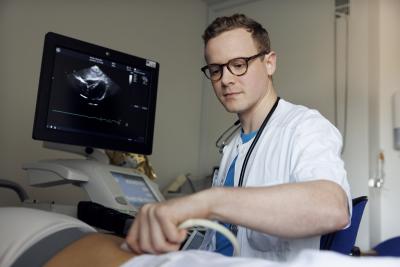Philip Brainin
Studying the cardiac cycle
Philip Brainin, doctor and postdoc, is receiving a 2021 Lundbeck Foundation Talent Prize for his ultrasound research on the heart's patterns of movement.
A human heart beats between 60 and 100 times a minute. It pumps blood in and then pumps blood out, keeping the body and brain running and alive.
However, in some people this pumping action is a little more complex than “blood in – blood out”.
‘Their hearts have a delayed contraction, a so-called post-systolic contraction. This means that the two pumping phases overlap slightly, so that when the heart should be pumping blood in, it is still in the process of emptying blood out,’ explains Philip Brainin.
Brainin is a doctor and postdoc at the ultrasound laboratory of the Department of Cardiology, Herlev-Gentofte Hospital, and he is one of the five young scientists who have recently been awarded a 2021 Lundbeck Foundation Talent Prize.
This delay lasts merely fractions of a second, and Brainin explains that sophisticated ultrasound scans of the patient are required in order to study it.
‘I’ve been working with these types of scan since I qualified as a doctor in 2017. And what I’m looking for is whether the post-systolic contraction has an impact on the patient's cardiac function. I examine people who’ve suffered coronary thrombosis or heart failure and compare their results with scans of individuals who have no known heart problems.’

Philip Brainin hopes that the results of the examinations will enable him, in time, to draw up a kind of risk assessment form. The form would provide a system for assessing the status of a patient’s heart based on measurements of its pumping action as well as a system that gives information about the risk of cardiac events – naturally, before they occur.
‘It would make a huge difference if we could use ultrasound scans of the pumping action of the hearts of a large number of patients to identify “red flags” – in other words, risk markers. This would enable us as doctors to improve our diagnostics and, thus, broaden our scope for providing treatment earlier than we can today.’
Philip Brainin has been pretty busy since he qualified as a doctor. At the beginning of 2019, he defended his PhD thesis on post-systolic contraction, and later the same year he travelled to the Amazon jungle in Brazil to conduct research.
For two years, he and Danish and Brazilian colleagues studied the correlation between malaria and cardiac disease. They worked under difficult conditions, with portable ultrasound scanners, way out in impassable areas of the Amazon basin. Here, they successively built up the world’s first biobank to elucidate relations between malaria and cardiac diseases using blood samples and scan results.
‘It was an extremely interesting and instructive trip. I’m busy analysing the results of the Amazon studies with my group, and they will also be able to give us more general information about the correlations between infection, inflammation and the development of cardiovascular disease,’ says Brainin.
Alongside these analyses, which are part of his postdoc project, Brainin will soon be embarking on a clinical training programme to become a specialist in cardiac disease.
